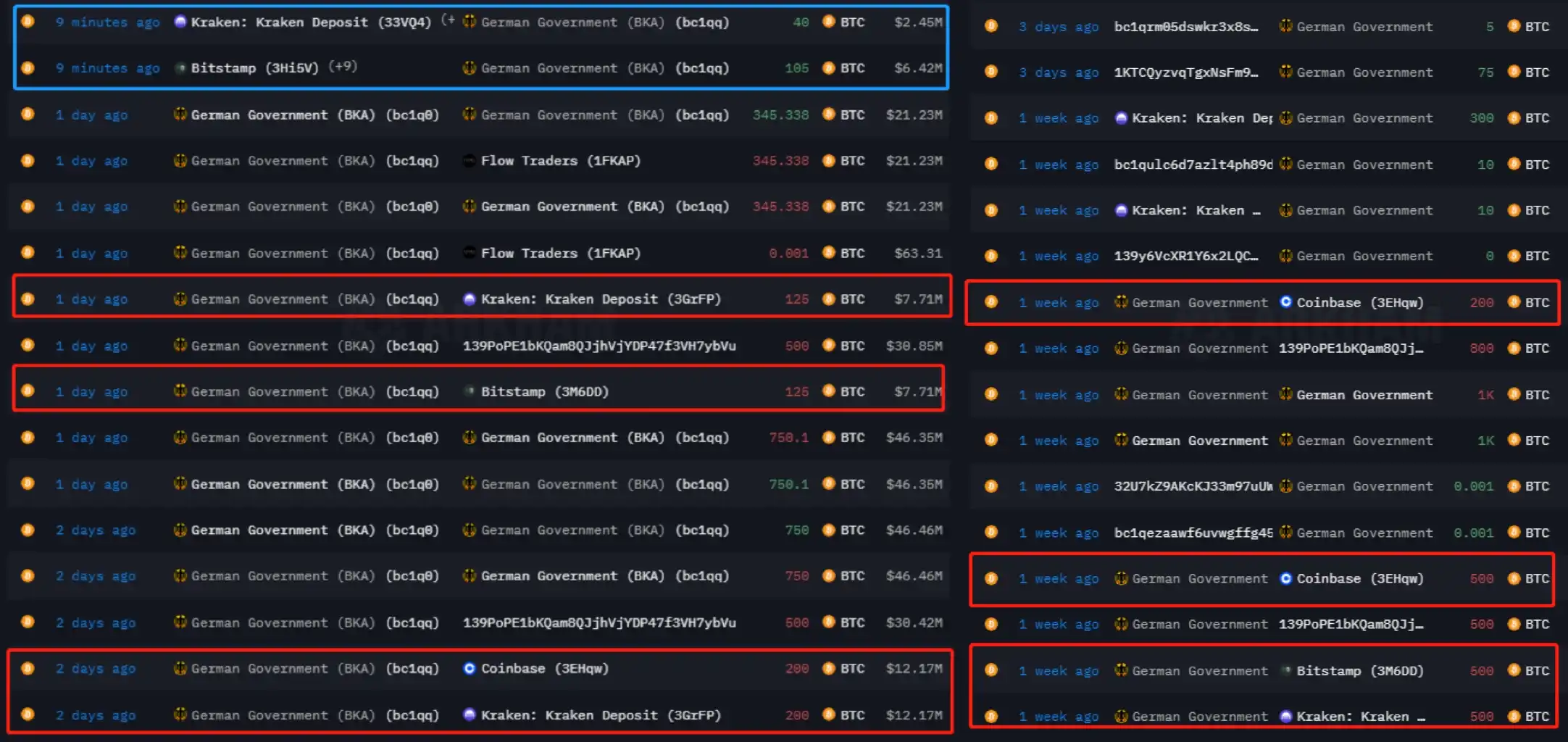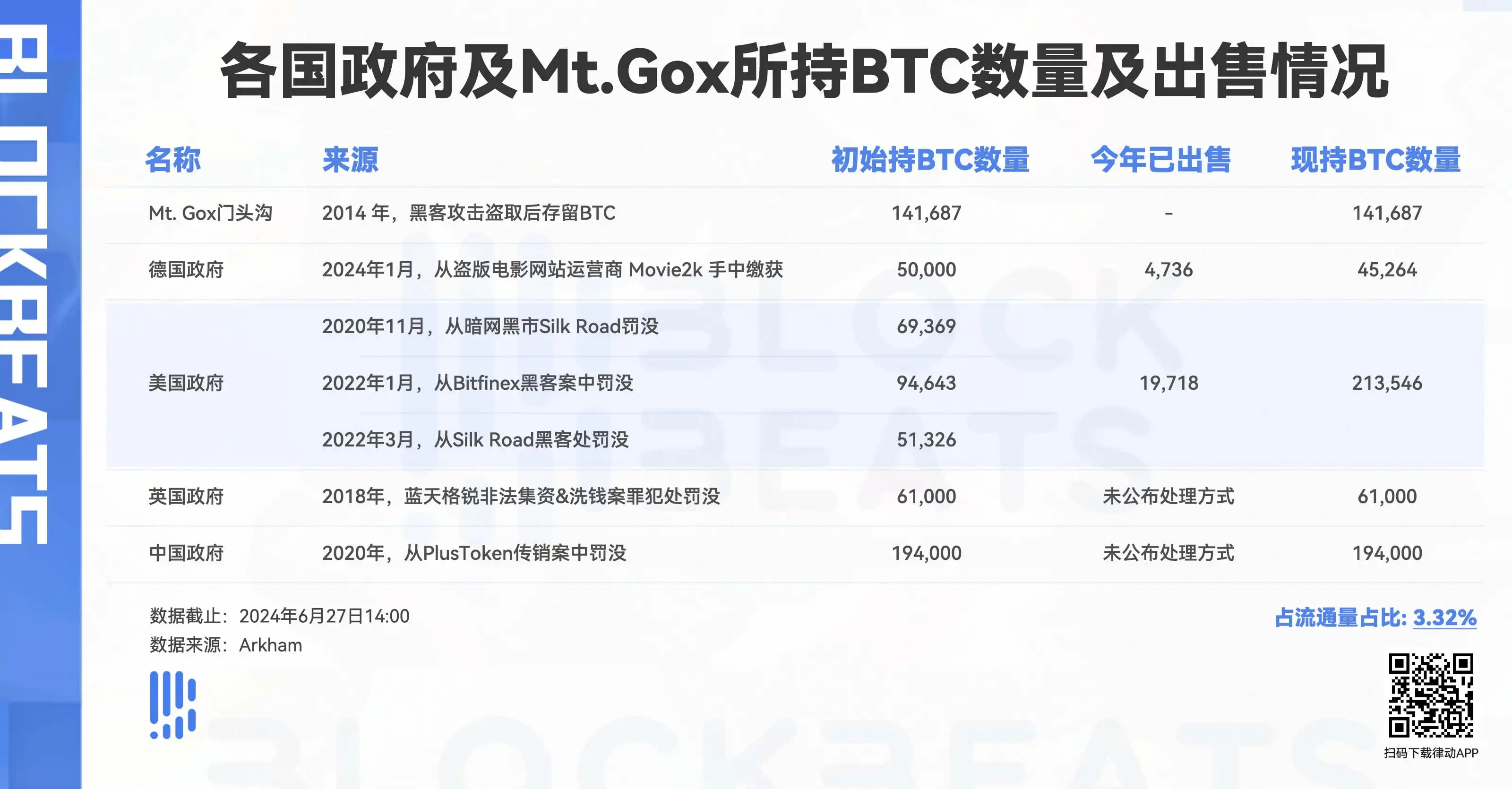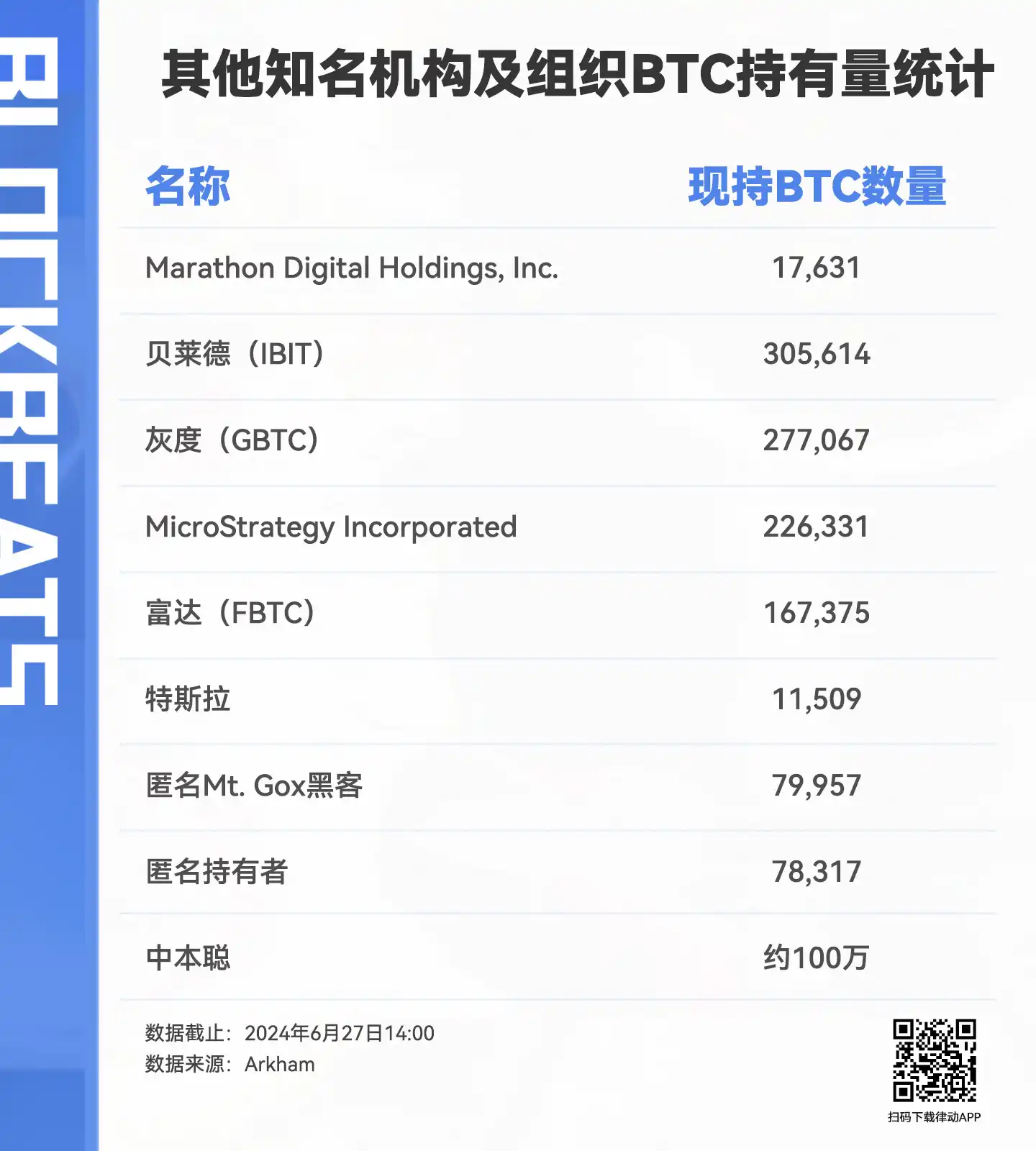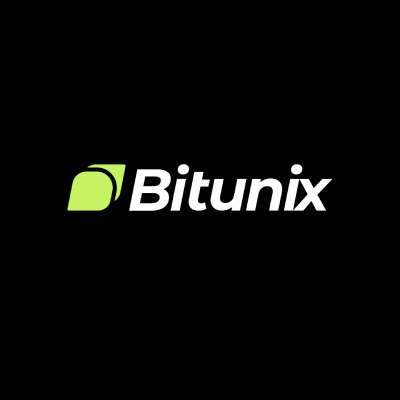کیا جرمنی اور امریکہ سکے فروخت کرنے کے موڈ میں ہیں؟ آس پاس کی حکومتوں کے ذریعہ بی ٹی سی ہولڈنگز اور فروخت کی انوینٹری
اصل مصنف: لیلا
In early June, a wallet marked as the German government began to transfer BTC previously seized from the pirated movie website operator Movie 2k to the trading platform. Coincidentally, the US governments BTC holding wallet, which had not been moved for a year, also sent 4,000 BTC to Coinbase on June 27, suspected of starting the coin selling mode. On the other hand, the progress of Mt.Goxs compensation has been put on the agenda again, and BTC and BCH repayments will actually begin in July.
In fact, according to incomplete statistics, from 2018 to date, the governments of China, the United States, Britain, and Germany have confiscated more than 500,000 BTC from hackers, money launderers, etc., and Mt. Gox currently holds 140,000 BTC. The above number of bitcoins accounts for 3.32% of the total circulation of bitcoins.
Although governments around the world currently basically adopt a batch and small-scale approach to selling BTC, since these countries themselves are not crypto-friendly, the final method of dealing with their BTC holdings is likely to be sales, so many users are very concerned about their holdings.
In this article, BlockBeats will briefly list the current BTC holdings of major institutions and governments, BTC sales, and how to track their addresses for monitoring, for readers reference.
Government holdings and sales
German Government – 45,000
Previously, it held 50,000 BTC, and as of press time, it had sold about 4,736 BTC in batches in June, with a current holding of 45,000 BTC. On June 25, 200 BTC were transferred to Coinbase and Kraken respectively; on June 26, 700 BTC were transferred to Coinbase, Kraken and Bitstamp again, but on June 27, 145 BTC were transferred back to the on-chain address again.

U.S. Government — 210,000
Compared with other countries, the US government holds the largest number of Bitcoins and handles them relatively carefully. Between November 2020 and 2022, US authorities seized a total of more than 210,000 Bitcoins in three separate operations, which were related to the dark web market Silk Road, Silk Road hacker Jimmy Zhong, and the hacker of the crypto exchange Bitfinex. Related reading: Bitcoin Dark Web Shocking Thief: Uncovering the Double Life of Jimmy Zhong .
The U.S. government has a long history of selling Bitcoin. However, the U.S. government has not sold Bitcoin since July 2023 to March 2024. On-chain records show that the most recent sale was 4,000 BTC sent from a U.S. government address to Coinbase Prime on June 27.
As of press time, the U.S. government still holds 213,546 BTC.

UK Government – 61,000
The Bitcoin held by the British government mainly comes from the famous Blue Sky Grey case. According to data, the British government holds about 61,000 BTC, and as of press time, no transfer has been made. Related reading: The worlds largest money laundering case: more than 61,000 Bitcoins were seized, and the mastermind behind the scenes is still on the run with $6.3 billion
Chinese Government – 194,000
The Chinese governments BTC holdings originated from the famous PlusToken pyramid scheme in 2020, when the amount of Bitcoin seized was approximately 194,000. However, no on-chain address markers were found, so it is difficult for us to confirm whether there are any sales records.

The whales of national governments cannot be ignored. However, according to data, the largest single sale of Bitcoin in the United States was in March 2023, when 9,861 Bitcoins were sold for $216 million. If the government sells in small quantities each time, the impact on market sentiment and currency prices will be smaller.
Mt.Gox — 140,000
In addition to the above-mentioned government holdings of coins being a major hidden danger in the market, the Mt.Gox exchange, which went bankrupt ten years ago, has also made it clear that it will start repaying BTC and BCH. According to data disclosed by Mt.Gox, its address holds a total of 141,685 BTC, which will be used for compensation and repayment.
On May 28, the Mt.Gox account address transferred 141,685 bitcoins in 10 consecutive transactions. This was the first action of Mt. Goxs cold wallet in five years, which attracted great attention from the community. According to the latest email notification from Nobuaki Kobayashi, repayment will begin in July 2024. This is the first time that Mt.Gox has made repayments in the form of BTC and BCH, which means that the 141,686 BTC (and a roughly equal amount of BCH) held by Mt.Gox will begin to flow into the market. These BTC account for 0.72% of the total supply of Bitcoin in circulation, worth approximately $8.54 billion.
Previously, BlockBeats interviewed Mindao, one of the creditors of Mt.Gox, about the situation. He said, Because most creditors have sold their money to those funds, this part of the selling pressure has been hedged long ago. And those of us who have held on to the end will definitely not sell it at this time. Related reading: 140,000 bitcoins transferred in 6 hours, will Mt.Goxs compensation trigger a large selling pressure? , Mt.Gox token repayment starts in July, these things need to be understood in advance
On June 24, Alex Thorn, head of research at Galaxy, wrote on the X platform that the number of tokens ultimately distributed in the Mt. Gox bankruptcy case will be less than people imagine, and the Bitcoin selling pressure caused by Mt. Gox will be less than expected.
BTC holdings of other institutions and organizations
In addition to the government, companies such as Tesla and MicroStrategy also hold BTC. After the BTC ETF spot was approved, companies such as BlackRock and Fidelity that opened BTC ETF investment funds also joined the coin holding army. Since there have been many related statistical articles before, the above companies’ coin holdings and address tracking methods will not be repeated in this article. Related reading can be found in: Unveiling the top Bitcoin holders: Global wallet address analysis and holdings

The second half of the year is still optimistic, patiently waiting for the release of positive news
The market experienced a sharp decline in June, which had a certain impact on investor confidence, but the long-term outlook for cryptocurrencies remains optimistic. The long-awaited ETH ETF is coming; the interest rate cut has not yet been implemented; presidential candidates Trump and Biden have successively announced their acceptance of political donations in the form of cryptocurrencies, showing goodwill to the cryptocurrency market. Various signs indicate that as the global economy changes, cryptocurrencies have already occupied a place in emerging economies. The second half of 2024 is even more worth looking forward to. Related reading: Crypto Market Outlook for the Second Half of the Year: Multiple Positives Such as the General Election and Interest Rate Cuts Have Not Yet Been Released, and a New Era May Be Ushering in After the Changes .
The bull market is far from over, please be patient and wait for the market to repair.
Appendix: The above huge BTC holding address on-chain tracking URL
Mt.Gox holding address: https://platform.arkhamintelligence.com/explorer/entity/mt-gox
US government holding address: https://platform.arkhamintelligence.com/explorer/entity/usg
German government holdings address: https://platform.arkhamintelligence.com/explorer/entity/germany
This article is sourced from the internet: Are Germany and the United States in coin selling mode? An inventory of BTC holdings and sales by governments around the world
Related: The neglected area of modularity: execution, settlement and aggregation layers
Original author: Bridget Harris Original translation: Luffy, Foresight News Not all components of the modular stack are created equal in terms of attention and innovation. While many projects have innovated on the data availability (DA) and ordering layers, only recently have the execution and settlement layers received significant attention as part of the modular stack. Competition in the shared sorter space is spurred, with many projects such as Espresso, Astria, Radius, Rome, and Madara vying for market share, in addition to RaaS providers like Caldera and Conduit, which develop shared sorters for Rollups built on top of them. These RaaS providers are able to offer Rollups more favorable fees because their underlying business models do not rely entirely on sorting revenue. There are also many Rollups that choose to run…







